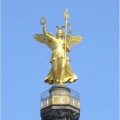While these Asian sloths transformed themselves into economic tigers, many billions of dollars of aid flowed into Africa. Yet, much of Africa became poorer, not richer, and more violent, not more democratic.
Economic freedom is as important to a successful economy, as political and civil freedoms are to democracy. Without economic freedom, growth and poverty reduction are impossible. No nation - none - has succeeded in these goals over the long term without economic freedom.
Economic freedom means personal choice, voluntary exchange, freedom to compete, and protection of the person and property. This requires the rule of law, property rights, limited government intervention, freedom to trade, and sound money. Economic freedom releases the ingenuity and drive of individuals, bringing new dynamism to economies.
The information to be released today will show, among other things, that nations in the top fifth of the economic freedom rankings have an average per capita income of over $36,000 and average economic growth of 2.6 per cent a year. Nations in the bottom fifth have per capita income under $4,000 and negative economic growth of 0.9 per cent. We will also show that Canada's back among the top 10 freest nations, but could do much better. As well, economic freedom correlates with low poverty rates, superior health outcomes, literacy, good nutrition, low levels of child labour, civil and political freedoms, and low levels of corruption.
Thanks to expanding economic freedom in China - the greatest poverty reduction program in world history, according to the World Bank - starvation has virtually disappeared. Under Mao Zedong's Communist regime, where all types of freedom were suppressed, tens of millions of died of starvation, more than in Africa, more than in Hitler's concentration camps. Economic freedom also promotes democracy. It reduces dependence on government and limits government's ability to reward its friends and penalize its enemies. Economic freedom creates power and wealth centres outside government and adds weight to the importance of competency relative to political connections.
The demands of the anti-globalists would send the world backward and increase the suffering of hundreds of millions of people. Anti-globalists want economic freedom, particularly the freedom to trade, restricted here and abroad.
The path to a better world is illuminated by freedom: civil, political and economic. That is what brought wealth to the west and, more recently, unprecedented prosperity to economically free nations in Asia. And, it already benefits Africans in at least one nation where economic freedom is on the rise.

